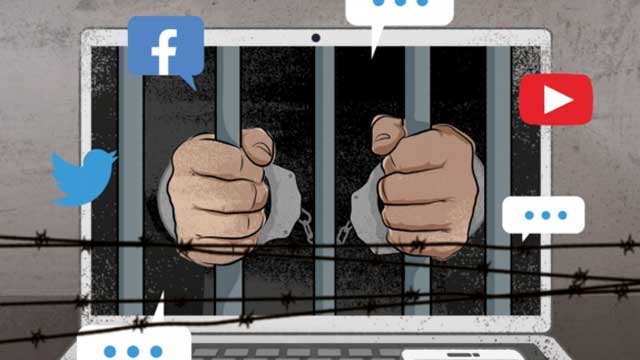Bangladesh Telecommunication Regulatory Commission’s draft regulation for digital, social media and OTT platforms is autocratic and contradictory to fundamental rights of freedom of expression, rights activists and experts said.
They termed the draft regulation a violation of the privacy rights, breaching the Universal Declaration of Human Rights and International Covenant on Civil and Political Rights.
They stated that the proposed regulation would provide unwanted and arbitrary power to law enforcers and called for revising the draft regulation in a webinar on Saturday.
Moulik Odhikar Shurokkha Committee (Committee for the Protection of Fundamental Rights), a civil society platform, organised the programme.
Supreme Court lawyer and Moulik Odhikar Shurokkha Committee convener Shahdeen Malik said that new law had been formulated to suppress democracy.
The formulation of new regulation, which is related to freedom of expression, makes people worried, said Shahdeen Malik.
He feared that the draft regulation would ultimately be used as a tool of repression.
Dhaka University teacher Mahfuzul Haque Supon said that the proposed regulation would empower the authorities to block internet contents at their will.
There would not be much judicial supervision in blocking online content.
He said that while communicating online and encryption of messages privacy was very crucial and the draft regulation undermined the privacy of communication.
He said that the draft regulation lacked adequate judicial oversight, clarity and predictability, and integration of human rights and it also contradicted the constitution of Bangladesh.
The draft regulation seems to have been noticeably copied from India's Information Technology (Intermediary Guidelines and Digital Media Ethics Code) Rules, 2021, Mahfuzul noted.
He said that the proposed regulation would hinder independent journalism.
Bangladesh Legal Aid and Services Trust honourary executive director Sara Hossain said that the draft regulation had no public consultations, which was required.
She said major questions came up who would be tasked with blocking content and removing contents from cyberspace, who would be directing for removal, would they act independently or was it going to be a government agency.
‘With prior experience, as in cases of the Digital Security Act, we have seen that even a police constable decides what can be said, what cannot be,’ Sara said.
She said that there must be an independent agency for monitoring cyberspace content. According to the draft regulation, BTRC might be tasked with cyberspace content monitoring and removal, but in reality, BTRC is not an independent agency.
‘We will see many difficulties and issues if content removal and blocking is conducted by BTRC,’ Sara said.
Independent University, Bangladesh’s law department teacher Nuran Chowdhury said that the free flow of information was essential for the fourth industrial revolution. Such regulation will hamper the free flow of information and ultimately thwart technology-based revolution, he said.





